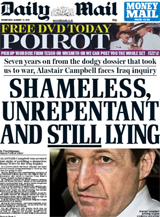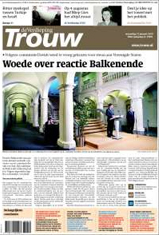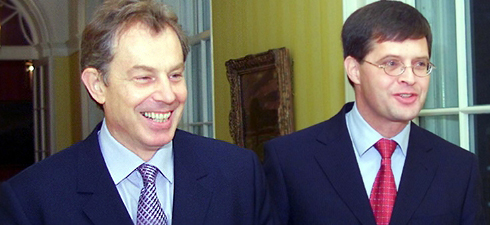 “Shameless, unrepentant and still lying,” goes the Daily Mail; “arch manipulator” according to Simon Hoggart in the Guardian; a “psychotic propagandist”, says Matthew Norman in the Independent. Just some of the fond epithets the British press has applied to Tony Blair’s former director of communications Alastair Campbell, who appeared January 12th at the Chilcot inquiry as it seeks to establish the truth behind Britain's decision to join the US led invasion of Iraq in 2003. "Basking once again in the limelight he so relishes," writes the Daily Telegraph, "Alastair Campbell produced a broadly familiar defence of Tony Blair's decision to lead this country to war". To wit - "that Tony Blair acted at all times in good faith in the light of persuasive intelligence."
“Shameless, unrepentant and still lying,” goes the Daily Mail; “arch manipulator” according to Simon Hoggart in the Guardian; a “psychotic propagandist”, says Matthew Norman in the Independent. Just some of the fond epithets the British press has applied to Tony Blair’s former director of communications Alastair Campbell, who appeared January 12th at the Chilcot inquiry as it seeks to establish the truth behind Britain's decision to join the US led invasion of Iraq in 2003. "Basking once again in the limelight he so relishes," writes the Daily Telegraph, "Alastair Campbell produced a broadly familiar defence of Tony Blair's decision to lead this country to war". To wit - "that Tony Blair acted at all times in good faith in the light of persuasive intelligence."
But what is the truth of the persuasive intelligence that Mr Campbell refers to? As Ibrahim al-Marashi reminds us in the Times, much of "the attempt to manipulate British public opinion" stems from a 2002 article he had published in The Middle East Review of International Affairs. The British government "took my material, then added pages that argued for military action against Iraq and changed key words to suggest that Iraq had supported al-Qaeda." In the report, now known as the "Sexed-up Dossier", which claimed "that Saddam Hussein presented a WMD threat", Campbell then inserted on four occasions that Saddam's non-existent WMDs could reach British territory in Cyprus at 45 minutes notice, which provoked headlines, as Simon Hoggart reminds readers, such as "Brits 45 Minutes from Doom." "I defend every single word of the dossier," asserted Mr Campbell yesterday. "I defend every single part of the process." In the light of such endless stonewalling tactics, the Independent bemusedly wonders what we have to learn from Mr Campbell's testimony that we did not know before. The answer is "not a huge amount. We gleaned a little more about Mr Blair's thinking and behaviour in the build up to the invasion. According to Mr Campbell, the Prime Minister sent letters to President Bush about the Iraq disarmament strategy, the gist of which was: 'If that cannot be done diplomatically and it is to be done militarily, Britain will be there'."
 "Campbell has prepared the ground for Tony Blair", the London daily comments, referring to the ex-Prime Minister's eagerly anticipated appearance at the inquiry at the end of the month. But first of European leaders in the firing line is Dutch prime-minister Jan Peter Balkenende. On January 12th, the non-governmental Davids inquiry found that the Netherlands' political support for the invasion - which included providing logistics faclities and allowing US troops stopovers at Dutch airports - was illegal because UN resolutions did not justify it. Lambasting the "domineering and, to be more accurate, the stubborn manner in which the Ministry of Foreign Affairs behaved," the dailty also notes that the report is particularly critical of Balkenende, accused by the inquiry of lacking leadership and of having “poorly informed” the National Assembly at the time, notably in relying on the “sexed up” British report on Saddam’s WMD. According to NRC Handelsblad, Balkenende has run into "heavy political weather" and "should ask himself whether his position is tenable". For the Rotterdam daily however, the one "positive conclusion for Balkenende" is "the confirmation that the Netherlands did not take a military role, and that Jaap De Hoop Scheffer [at the time minister of Foreign Affairs] doesn't owe his designation as NATO Secretary General to (that) support".
"Campbell has prepared the ground for Tony Blair", the London daily comments, referring to the ex-Prime Minister's eagerly anticipated appearance at the inquiry at the end of the month. But first of European leaders in the firing line is Dutch prime-minister Jan Peter Balkenende. On January 12th, the non-governmental Davids inquiry found that the Netherlands' political support for the invasion - which included providing logistics faclities and allowing US troops stopovers at Dutch airports - was illegal because UN resolutions did not justify it. Lambasting the "domineering and, to be more accurate, the stubborn manner in which the Ministry of Foreign Affairs behaved," the dailty also notes that the report is particularly critical of Balkenende, accused by the inquiry of lacking leadership and of having “poorly informed” the National Assembly at the time, notably in relying on the “sexed up” British report on Saddam’s WMD. According to NRC Handelsblad, Balkenende has run into "heavy political weather" and "should ask himself whether his position is tenable". For the Rotterdam daily however, the one "positive conclusion for Balkenende" is "the confirmation that the Netherlands did not take a military role, and that Jaap De Hoop Scheffer [at the time minister of Foreign Affairs] doesn't owe his designation as NATO Secretary General to (that) support".
Like other international actors great and small to the affair, the Dutch prime minister takes the same tack as Campbell, in spite of the disconnect between the reasons behind the invasion and its appalling reality.For Trouw, traditionnally close to his Christian Democrat party, Balkenende, in choosing to "sweep aside" whatever the inquiry can throw at him, is to be praised for his "combativeness" but is also guilty of a "lack of reflection". "Yesterday, Balkenende said the legal arguments were not the only ones at the time. International politics were also taken into account", writes the Amsterdam daily. Unfortunately, "this would have sounded more credible if he and De Hoop Scheffer hadn't endlessly backed up such support by citing the legal arguments".
Was this article useful? If so we are delighted!
It is freely available because we believe that the right to free and independent information is essential for democracy. But this right is not guaranteed forever, and independence comes at a cost. We need your support in order to continue publishing independent, multilingual news for all Europeans.
Discover our subscription offers and their exclusive benefits and become a member of our community now!












